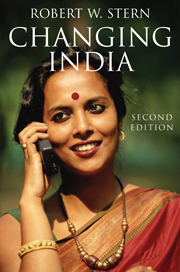Book contents
- Frontmatter
- Contents
- List of maps and tables
- Preface to the second edition
- Glossary
- Introduction: Change, the societies of India and Indian society
- Part I The changing countryside
- 1 Families and villages
- 2 Caste
- 3 Class
- 4 Homelands and states
- Part II Change from above
- Appendix One Major political events in the related histories of British imperialism and Indian nationalism, 1858–1947
- Appendix Two Major political events in the history of the Indian Union, 1947–2002
- Notes
- Guide to further reading
- Index
3 - Class
Published online by Cambridge University Press: 18 April 2011
- Frontmatter
- Contents
- List of maps and tables
- Preface to the second edition
- Glossary
- Introduction: Change, the societies of India and Indian society
- Part I The changing countryside
- 1 Families and villages
- 2 Caste
- 3 Class
- 4 Homelands and states
- Part II Change from above
- Appendix One Major political events in the related histories of British imperialism and Indian nationalism, 1858–1947
- Appendix Two Major political events in the history of the Indian Union, 1947–2002
- Notes
- Guide to further reading
- Index
Summary
In the last chapter I indicated that the notionally sacred social systems of Indian villages have, in fact, substantial and growing secular components. These are, primarily, of wealth, power and influence. They are likely to be enjoyed by village households to the extent that they control the productive assets of their villages. In most villages the primary productive asset is land. To the extent of their holdings, then, households which control land are likely to enjoy wealth, power and influence. These are also likely to be enjoyed by households that control capital: money, for example, which can be loaned, bullocks or tractors for hire, access to state or cooperative society development funds or remittance income from urban employment. Some, though not all, village households that control capital also control land. Then, of course, there is the “other half.” They control neither land nor capital. They are poor, powerless, without influence and readily exploitable by households that control land and capital. Between a village household that holds ten hectares and one that is landless there exists in all this implies as stark a contrast between wealth and poverty as we are likely to meet in London or Manhattan.
Can we discuss class relationships among villagers? Certainly. They exist, and in my experience and from reports of scholars and journalists, it seems clear that villagers nowadays are acutely conscious of class differences among themselves and between them and non-villagers.
- Type
- Chapter
- Information
- Changing IndiaBourgeois Revolution on the Subcontinent, pp. 88 - 106Publisher: Cambridge University PressPrint publication year: 2003



